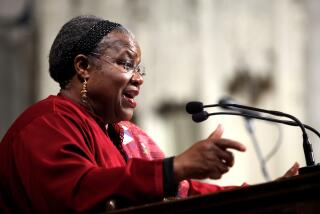Bernard W. Rogers dies at 87; Army general introduced major reforms
- Share via
Reporting from Washington — Bernard W. Rogers, a four-star general who introduced major reforms as Army chief of staff in the 1970s and who later was the top military commander of NATO, died Oct. 27 in Virginia after a heart attack. He was 87. After bringing changes in recruiting and training to an Army whose morale had been depleted by the Vietnam War, Rogers became the longest serving military chief in NATO’s six-decade history.
He strengthened the trans-Atlantic military alliance’s presence throughout Europe and, according to a 1985 Business Week article, was “widely viewed as the most effective NATO chief since the first, Dwight D. Eisenhower.”
He replaced Alexander Haig as supreme allied commander in Europe in 1979 and was elected to an unprecedented four two-year terms as NATO’s military leader.
Rogers repeatedly warned against relaxing Western military readiness in the face of what he saw as a powerful Soviet threat. He instituted a doctrine of warfare emphasizing mobile, high-impact strikes that has since become a dominant military strategy.
When the Reagan administration signed a treaty with the Soviet Union requiring each side to withdraw intermediate-range missiles from Europe, Rogers called the agreement “foolish.” He said the Warsaw Pact’s superiority in foot soldiers and conventional weapons left NATO forces at risk of being quickly overrun.
His stance drew a pointed rebuke in 1987 from Secretary of State George P. Shultz, who called the general’s comments “way out of line.” Rogers soon retired.
Rogers, who spent 44 years in uniform, had an unusual combination of talents as a combat commander, intellectual and statesman.
Addressing a NATO conference in 1979, the former Rhodes scholar said, “One cannot help but to be impressed -- perhaps depressed is the better word -- by the folly, futility and waste of war as a means of resolving man’s problems.”
Bernard William Rogers was born June 16, 1921, in Fairview, Kan., and graduated in 1943 from the U.S. Military Academy at West Point, where he was elected first captain of cadets.
After World War II, he was briefly an aide to Gen. Mark Clark, the commander of U.S. forces in Austria. In 1947, Rogers received a Rhodes scholarship to Oxford University, where he received bachelor’s and master’s degrees in economics and philosophy.
He was a decorated infantry commander in the Korean War and held intelligence positions before becoming executive officer to Maxwell Taylor, chairman of the Joint Chiefs of Staff, in 1962.
As assistant commander of the First Infantry Division in Vietnam in 1966 and 1967, Rogers was awarded the Distinguished Service Cross -- the Army’s highest award for valor after the Medal of Honor -- for leading a successful counterattack against a Viet Cong raid on a South Vietnamese special forces camp.
He rallied troops on the ground and personally scouted enemy positions from a low-flying helicopter under heavy fire.
After two years as commandant of the corps of cadets at West Point, Rogers took command of the Fifth Infantry Regiment in Fort Carson, Colo., in 1969. At a time of falling morale, he made sweeping changes in the daily routine of soldiers by abolishing kitchen duty (KP), reveille, roll call and Friday night “GI parties,” in which soldiers scrubbed the barracks for Saturday inspections.
He established councils for junior officers, enlisted men and racial minorities to express their concerns and set up a Greenwich Village-style coffeehouse, with folk singers.
Old-line officers were aghast, but enlistments soared, and Rogers became known as one of the brightest thinkers in the Army. He continued the reforms as Army chief of staff from 1976 to 1979, improving training programs and developing plans for a modern “quick-strike” force. He also took steps to make the Army more friendly toward women and minorities, calling on commanders to “eliminate any discriminatory handling of soldiers.”
Schudel writes for the Washington Post, where this obituary first appeared.
More to Read
Start your day right
Sign up for Essential California for the L.A. Times biggest news, features and recommendations in your inbox six days a week.
You may occasionally receive promotional content from the Los Angeles Times.






